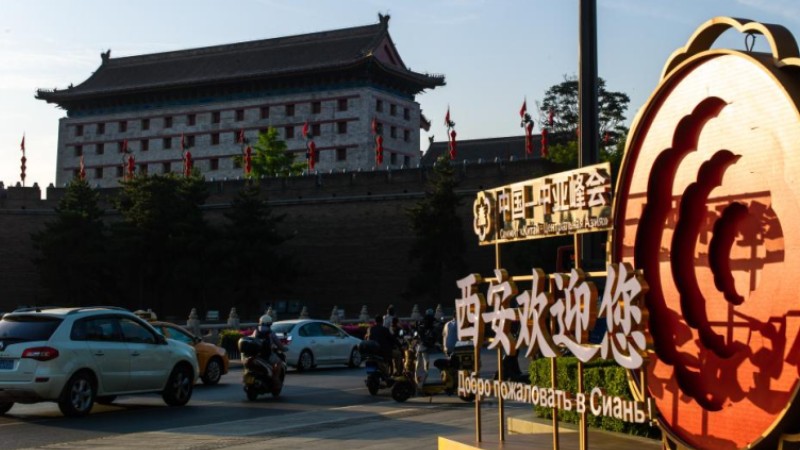U.S. stokes confrontation in Asia Pacific, raising widespread concern
BEIJING, May 20 (Xinhua) -- In a recent opinion piece for Japan's Nikkei Asia website, Marco Rubio, the U.S. Congress's leading China-basher known for his comical but dangerous preoccupation with the "China threat" narrative, argued for building a regional anti-China coalition in the Asia Pacific region.
Rubio is not alone in his fervor for a bloc confrontation with China. Trapped in a Cold War mindset, the U.S. administration has been keen on creating "small cliques" directed against China.
Experts in the Asia Pacific region warn that the U.S. attempt to maintain hegemony through camp antagonism imperils regional peace and security.
PRESSING FOR SMALL CLIQUES
In recent years, Washington has been peddling the so-called "Indo-Pacific strategy" and "great power competition" in an effort to build an alliance in the Asia Pacific region with the primary goal of containing China.
Despite widespread criticism, Washington abetted the Japanese government in altering Japan's core national security policy. As a result, Japan is aspiring to become a major military power, posing new challenges to regional peace and security as it increasingly allies itself with U.S. forces.
Despite holding large-scale joint military exercises, the United States and South Korea have reached strategic agreements on "extended deterrence," with Washington deploying more "strategic assets," including nuclear-capable submarines, to the Korean Peninsula.
Washington is also nudging South Korea and Japan into a reconciliation, with an eye to forming a trilateral military alliance.
In April, the United States and the Philippines conducted the most extensive joint military activities in decades. In February, the Philippines allowed the U.S. military access to four additional military sites on top of the five previously agreed locations nationwide. In addition, Washington is also attempting to form U.S.-Japan-Philippines and U.S.-Philippines-Australia trilateral cooperation mechanisms.
The trilateral Australia-UK-U.S. (AUKUS) cooperation on nuclear submarines has also put regional peace and stability in jeopardy.
SEEKING HEGEMONY, EXPORTING DESTABILIZATION
As analysts have pointed out, the United States has forged a series of cliques in the Asia-Pacific region and strengthened military cooperation with its allies in the name of "coping with threats together," but its real intention is to tie its allies to the U.S. chariots and take advantage of others to salvage its own declining hegemony.
Kazuteru Saionji, a visiting professor at Higashi Nippon International University in Japan, said that in an attempt to keep its regional hegemonic position, Washington deliberately creates differences between some countries and China, inducing them to join the camp confronting China.
The United States, Japan and South Korea say that they have been strengthening their deterrence against the Democratic People's Republic of Korea (DPRK), but in fact, they are intent on containing China, said Kim Dong-yup, a professor at the University of North Korean Studies.
To make regional countries serve U.S. hegemony, Washington smears China as a "threat" to the region and even to the world. However, "the U.S. has hundreds of military bases outside its own borders and has installed numerous governments in foreign countries replacing those that don't conform to its ideology it calls 'democracy,'" said Colin Mackerras, an honorary professor from Griffith University of Australia, in an article titled "The dangerous one is the U.S.."
By pulling regional countries into its cliques, the United States will only undermine regional peace and stability, said experts. Kwon Ki-sik, head of the Korea-China City Friendship Association, said that the United States is busy recruiting South Korea to its "new Cold War" camp and engaging in bloc confrontation, which will not only destabilize peace on the Korean Peninsula, but also pose a new threat to the security of Northeast Asia.
Anna Malindog-Uy, vice president of the Manila-based think tank Asian Century Philippines Strategic Studies Institute, said that by wooing the Philippines, the United States is provoking more tensions and divisions in the Asian-Pacific region, threatening regional peace and stability.
GROWING OPPOSITION, WIDESPREAD CONCERN
As the vicious intentions and huge risks of the U.S. cliques in the Asian-Pacific region are exposed to the world, opposition to bloc confrontation is reverberating through the region.
Noting the Japanese government's efforts to abandon its pacifist postwar defense strategy to serve the U.S. "Indo-Pacific Strategy," Atsushi Koketsu, professor emeritus at Yamaguchi University, said that the security policy for Japan should be to contribute to world peace in the fields of economy, medical care and culture, rather than beef up its military strength, adding that Japan has chosen a very dangerous road by aligning itself with the United States militarily.
South Korean media also voiced concerns and doubts about its government joining the U.S.-Japan camp. The Hankyoreh warned that if South Korea gets involved in a "new Cold War" instigated by the United States, security risks around the peninsula will increase significantly, and the security situation of South Korea will become more unstable.
Lee Jong-seok, former South Korean Minister of Unification, wrote in an article that in the name of shared values, the United States has declared that it needs to engage in military and political cooperation with Japan and South Korea at the alliance level, but it is doubtful what South Korea will get out of the cooperation.
Philippine President Ferdinand Romualdez Marcos said recently that the country's military bases will not be used to attack other countries, including China. Analysts believe that this statement indicates that the Philippine side is unwilling to get involved in bloc confrontation provoked by the United States, but the U.S. coercion put it in a dilemma.
The independent foreign policy of the Philippines is being severely tested, and the deepening of security and military cooperation between the Philippines and the United States is disturbing, said Malindog-Uy.
Australian politicians have publicly criticized the AUKUS nuclear submarine pact. In the Australian parliament, Senator Jordan Steele-John said it was one of the most catastrophic foreign policy decisions an Australian government has ever made. Australians will see their public money subsidize British and U.S. defense manufacturers, he said, adding that the deal "forever shackles us to the United States of America."
Analysts pointed out that at a time when countries are increasingly interconnected, it is against the trend of the times and harms the common interests of all mankind to engage in bloc confrontation with a Cold War mentality.
The 21st century is a century of pursuing common prosperity and building a foundation for peace, Koketsu said, urging the United States to focus on seeking cooperation with other countries in creating world peace and prosperity.
Photos
Related Stories
- Five creators sue U.S. Montana's attorney general over TikTok ban
- Every U.S. president since Reagan has mishandled classified documents: report
- Russia bans 500 Americans from entry
- U.S. sanctions erode women's rights, says Venezuelan official at UN committee
- U.S. Senate holds 3 days of hearings following bank crash
- Roundup: Criticism of U.S. Montana's new anti-climate change law growing daily
Copyright © 2023 People's Daily Online. All Rights Reserved.









